|
|
| 'Like' us on Facebook | Follow us: |
Posted on : Dec 09, 2012
“Faces of My Patients is My Strongest Elixir”
- An inspiring short conversation with Dr. Ramnath Iyer
The Sri Sathya Sai Institute of Higher Medical Sciences in Puttaparthi was inaugurated by Bhagawan Baba on Nov 22 1991. And within a year or two of its operation, Dr. Ramnath Iyer joined the Department of Cardiology as a Senior Resident and today, twenty years later, he is a Senior Consultant, and as enthusiastic and spirited as he was two decades ago. “This is my Cardiac CCU” he says with pride and joy, and continues, “I always feel it is like my own private hospital... this is what drives me, such a thing is not been done anywhere else in the world. Bhagawan has dared to put such a grand philosophy into action.”
In this brief conversation with Radio Sai's Bishu Prusty, Dr. Iyer recalls the shocking and sublimating moments which shaped him during his initial days in the Hospital, and then goes on to narrate some very telling scenes which have moved him and motivated him time and again to dedicate His life to Bhagawan's mission with great eagerness and earnestness. This was recorded on November 21, 2012, a day before the Hospital's 21st anniversary.
Radio Sai (RS): Sai Ram Sir, the hospital celebrates its 21st anniversary this year (2012) and you are someone who has been in the Hospital for more than two decades serving in the Department of Cardiology. May I ask you, how do you reflect on your stay in this hospital at this point of time?
Dr. Iyer: Sai Ram. Well, your question pushes me down the memory lane and the nostalgic surge of many sweet memories come up... right from the uncertainties which surrounded my personal self when I landed here to the sureties and certainties which I see today, two decades down the line.
Way back in 1993 when I came here I knew Puttaparthi but I didn’t know where it was; I had never come here before and did not know Telugu. People asked me what prompted you to quit a well-paid permanent job and come over here for a temporary one year contract.
I said, first, it is a madness to work in cardiology.
Secondly, a madness to work in an environment which didn’t exist at that point in time in any other hospital in this country. It will not be out of place if I acknowledge the role which my wife played in making this very tough decision.
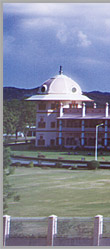 |
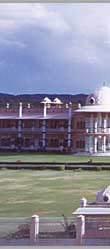 |
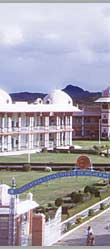 |
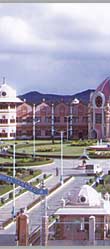 |
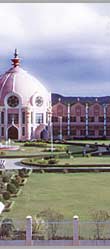 |
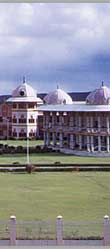 |
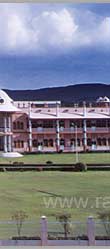 |
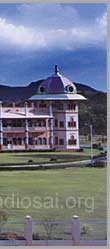 |
After landing here there was a kind of, I would say, cultural shock because here was a Hospital in an almost deserted place; there wasn't even a tea shop in the surrounding area.
And you had the best of the equipments and the services being provided to a group of people who possibly couldn’t have even dreamt of affording primary medical care of this nature anywhere in this country. So honestly speaking even as a participant or as a worker in the hospital, and also as a doctor I had my own shock to get over with and get into the system.
As the work ethics and the work culture of the system started percolating into me and into others who joined with me or after me and who have continued to serve here, I realized later on about the inner transformation affected by Bhagawan without any personal interaction.
Baba gave you the environment, I would call it, the sadhana sthal, a place to do your spiritual practises as part of your work. In today’s world I feel there cannot be a better form of sadhana, you need not go to the forest or sit secluded in some cave or some monastery or somewhere in the mountains; Baba just gave it to you.
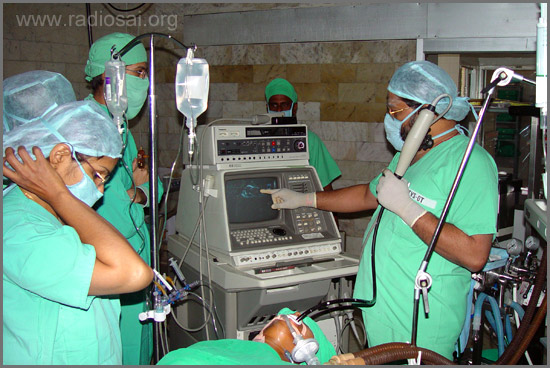 |
So what more luxury can I have? I am in my work spot and during the course of my work, inner transformation is taking place; that is as far as personal growth is concerned.
Many people ask me how did you manage to stay put there for two decades. I said this was that intoxicating wine which has sustained me this far. Because anywhere else in this country we will not get this, even if you look from the patients' angle.
Imagine a patient coming from as far as Sikkim or Nepal or Sri Lanka or Bangladesh or borders of Bihar or Uttar Pradesh or West Bengal; he lands up here and when we see the patient we know what is to be done. Anywhere else we have to first find out what is his paying capacity, and then you have to give him the options.
But here it is no holds barred; if he has a medical condition for which my discipline offers a cure Bhagawan is kind enough to provide us the state of the art equipments for our diagnostic aid. I am in the cardiology wing, so whether it is catheters, balloons, stents, etc. we have the best the industry offers today.
Number two: Many people had this impression that if something is given free of cost you have to cut corners; you can’t obviously perennially go on charity. But Bhagawan proved it otherwise to the world.
Today as we are heading towards the 21st anniversary we can be proud to state that every day and in every moment when we are here we have His presence with us. Even today in spite of His physical absence amongst us there has not been an even 0.000001% reduction in the quality of care offered to the patients – this is the greatest thing.
Many people predicted that now that the physical form of Bhagawan is not there, there might be drastic fall in care, no such thing has happened. We are still today working with the same zeal and enthusiasm and for us He is a living presence.
 |
 |
 |
 |
 |
 |
 |
 |
I can say that when I joined here two decades ago I was one of the few people, who only occasionally used to go to have His physical darshan but that was compensated for, by all the blessings He showered on us when we were in our field of work. So we had that feeling ‘Oh, He is there’.
RS: In all these years of stay in Prasanthi Nilayam you must have had so many occasions when Bhagawan gave you directions directly; the times when you had the opportunity to speak to Him and learn from Him about how to work in this Hospital. Can you recollect one or two of those unforgettable moments?
Dr. Iyer: Well, the list is endless but I think one of the first interactions I had with Him within a few days of my joining gave me a reassurance which has helped me through all these years.
At that time I was new to this place and there was this custom of everybody going for a morning darshan and an evening darshan. My problem was, I had my work and my conscience was saying that I shouldn’t leave the work and go for a darshan - that’s how I was, right from my childhood.
As a child I remember sometimes having arguments with my parents, they said ‘temple first' but I said 'I’ll finish my work and then if there is time I will go to the temple’. Somehow they all disagreed and said ‘No, going to the temple is important’. And I said 'No, first I will do work'.
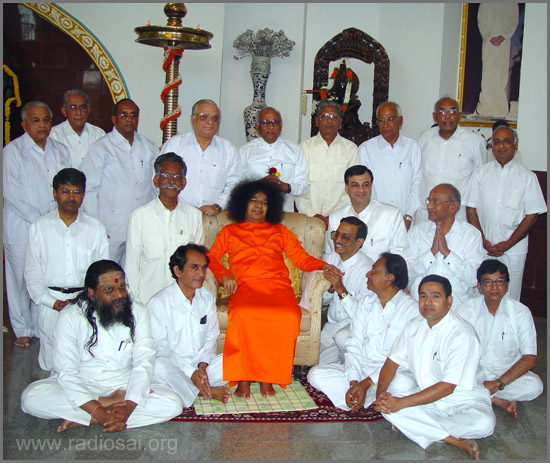 |
|
| Bhagawan with the doctors during his special visit to the hospital, December 2004 |
So with this kind of a conflict going on in the mind, one day I go and sit in the darshan and Swami comes and stands right in front of me, gives a smile and then says: ‘Look, I have appointed you in this Hospital, I don’t expect you to come to see Me every morning and evening’.
I had not told him anything, I had not given Him a letter but the conflict was going on in my mind. He clearly said ‘I have given you a duty in My Mission in the Hospital, keep doing that. Your problems and needs, I’ll take care’.
I don’t know about others but speaking for myself - and my wife is the living testimony for this – she says that I am the only one who followed it to the letter till the last. In the last 4-5 years my darshans were restricted to hardly 4 or 5 times in a year, rest of the time I was in the Hospital.
So much so at a much later time, once when Bhagawan came to the Hospital, when He saw me His opening remark was: “This is your Ashram.” And He wasn’t wrong because my whole life revolved round my residence, which is two minutes walk from the Hospital and this Hospital. I used to very rarely step out of the gates of the Hospital. So with that kind of an assurance I never felt the absence of the physical form. I used to get the thrill of the physical form once in a while, but His continued presence is there day in and day out when I am working in this Hospital because finally it is His work and we are all mere ordinary instruments. We feel fortunate that we were lucky to be selected by Him as His instruments, that’s all.
Now if you ask for interesting anecdotes, well if I start now maybe I can continue as a marathon for two or three days narrating various incidents that happened at different points in time. But yes there are certain incidents which left an indelible impression on your mind and which further strengthened your resolve to continue here in spite of whatever be the odds, if any.
I remember this happened within a year of my joining here. A police constable from somewhere in Warangal lands up here with his wife and two children. One was a daughter of about three and half years, and the other was a new born – a one or two months old son, and both of them had cardiac problems.
I was just a fresher then who was trying to get a feel of the department, so I brought this to the attention of the then consultant. They were examined and echo cardiography was done. The elder one's problem was less serious; the younger one had a very dangerous defect. Now the issue was you can’t obviously take both of them together; there are certain medical rules. So since chances were better for the elder one, she was taken up first. She was admitted, catheterisation was done, and finally the surgery was also performed. She had a stormy post operative course but by Swami’s grace she recovered and went home.
Usually we call all our operated patients to come three months post their surgery. And at that time we told this person ‘please bring your son also, we’ll see if we can do something’.
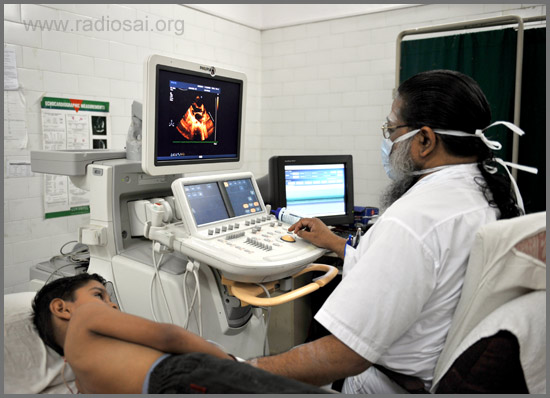 |
So he came back, and this boy had a condition where his defect was such that the pure blood was going into the lungs and the impure blood was going into the air duct for circulation throughout the body. It’s a rare but very dangerous condition, the surgery for this is also equally technically challenging.
And I am proud to state that we took up the case, and that boy was about five months at that time, we did a catheterisation and sent him for surgery. That was the first time that kind of a surgery was performed in this Hospital; it was 1994. It was a matter of great pride and thrill, most importantly, when you see the family coming back with the boy now grown up as a strapping young adolescent, the joy is immeasurable.
Later on this couple had a third child. I still remember about couple of years after the surgery he brought the first two children for checkup and we said ‘Both of them are fine, you can go home’. And now he had a request: ‘Sir if you don’t mind can you examine this new baby too’. I said, ‘Why, what happened?’
‘Nothing, we are just scared because first two had problems,' he said. By Swami’s grace the third one was perfect, so they went home happily. This is just one of the many.
Before I tell you another story let me say that according to me coincidence is a word of convenience coined in the English literature. I refuse to accept that every such instance where you think many things happen to your convenience is just a coincidence. Indeed, that is where you tend to believe that there is some kind of an invisible hand playing behind many of the events which take place with most of us in our lives.
One evening, after seeing the outpatients I had just come to the emergency bay - this critical care unit where we are currently talking. A Russian lady was brought in; she had collapsed as soon as she arrived at the outpatient department of the Hospital.
So she is rushed and brought to this very bed near which we are standing now and examined. She had a condition where the rate of beating of the heart had slowed down. Hers was around 24-25 beats against a normal of anywhere between 70-100.
And mind you, this lady has travelled all the way from Russia and to come here; this event could have happened anywhere in between and she could have succumbed. But she lands up here and then collapses. So we stabilise her.
Later she goes on to tell that when she consulted hospitals in Moscow and in the surrounding areas about this problem, everybody told her that she needed a pacemaker but the cost was astronomical which she just couldn’t afford.
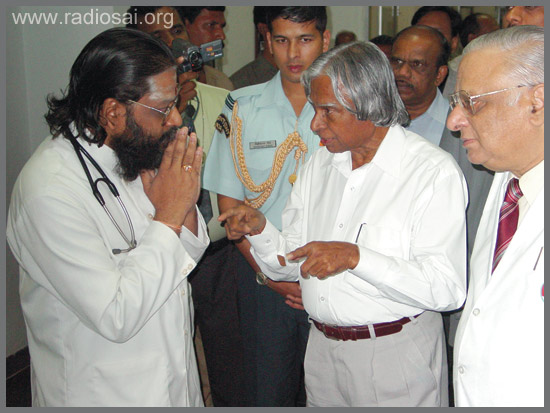 |
|
| Dr. Iyer interacting with Dr. APJ Abdul Kalam, when the latter visited the hospital during his tenure as the President of India, Nov 2002 |
|
And about five to six years prior to this, she had come to Puttaparthi and was one of the lucky ones to be selected by Bhagawan for a personal interview. And on that occasion He gave her a medallion which she has been carrying with her in her purse throughout; she showed this to all of us. She had then decided that 'No matter what happens I am going to go to Puttaparthi. If I can get a pacemaker done there, it is fine, otherwise I prefer to die there.' With this resolve she had come here.
Imagine someone travelling all the way from Moscow to Bangalore and then to Puttaparthi, and nothing happens to her all along the way but the moment she comes to our department she collapses. Her condition is of course stabilised. In the next couple of days, needful investigations are done, first a temporary pacemaker is implanted and later a permanent pacemaker is fixed and she goes home.
Now you may say ‘Oh it's coincidence’. Such instances have occurred umpteen number of times here and each time you cannot say that it is coincidence. Whenever we ordinary mortal human beings have our doubts Swami creates dramas and reinforces His message: ‘I know it, I do what is appropriate, you just do your work’. The moment we try to rationalise, that is when crisis of faith occurs.
RS: The department has achieved so much in the last 20 years; it has seen a variety of cases and grown professionally and technically. How do you see the road ahead for this department?
Dr. Iyer: Well, that’s a wonderful question. When I came here this Critical Care Unit was closed; I can say this with a matter of pride that it’s my baby. We opened it and started off with one bed and today we have a fully air-conditioned and equipped 15-beds unit; I can connect the ventilator to any of the beds.
We worked for it and brought it up to this level. Of course it was possible because of Bhagawan’s grace but then that is the attitude with which we entered this premises - we took it as if it is our personal belonging, it's like my own private hospital.
And Bhagawan was kind enough to give us all equipments and instruments – the best of the lot, be it echocardiography machine or the cath lab or anything else - there was no dearth of it.
As regards to work, well there is no dearth of work too. I would still feel that if I had more number of hands the quantum of work can be more.
Secondly, talking about the spectrum of work, yes I think we have one of the most enviable records - you can compare it with the best of the teaching institutions anywhere in the country.
 |
 |
 |
 |
 |
 |
 |
 |
In 1994 the post doctoral training programme in cardiology was started here and I was then selected as the first candidate for it. I underwent the training and appeared for the exam and cleared this. Now I was given a choice – I could continue here or go elsewhere for greener pastures. I stuck to this more greener pasture and I am continuing till date, I have no regrets.
So like me, after me many students have come and have been trained, and they have gone out, wherever they are they have established their mettle, they are indeed some of the top most cardiologists in their region.
I still feel a lot more needs to be done. If you ask me, the greatest miracle of Bhagawan is establishing such a great Institution in this backward district. But in fact I had submitted a personal prayer to Bhagawan on at least two or three occasions – yes, this place needs this Hospital but more than that, it needs a medical college. I feel, with all basic departments, a medical college combined with a Hospital would be the greatest boon to this district in furtherance of what Swami has done as long as He was in His physical form.
And I feel that would be my only prayer to the trustees. I am not saying, start it today or tomorrow but as and when logistically it permits we should start this. Because that will be a perpetual legacy which will go on. So that is my personal dream about the future course of action. From the point of work, yes there is no ceiling on where you can stop your work. As I said if I have more beds and more staff and more equipments, we can do more work.
RS: Finally may I ask you what is it that drives you to come to this Hospital when you wake up every morning.
Dr. Iyer: At the end of everyday, the satisfied look on the faces of many of the patients whom we treat and discharge them happily to go home - I think that is the strongest elixir which you get.
Secondly, particularly in this country, anywhere else even if I have the skill and the knowledge, in order to give it to a patient many a times I am forced to look at the pocket of the patient. This is the only place in this country where I need not do that. If it pertains to my discipline, if it is being offered in this Hospital I can offer one and all. I think that is such a big comfort. No distinction of any form, be it caste, creed, colour, religion, nationality... you name it.
 |
 |
 |
 |
 |
 |
 |
 |
Since you asked this question, there was this Muslim patient from Kerala who had come with his daughter. She had what is called a narrowing of one of her heart valves and I was the one who took her to the cath lab and opened it with a balloon. This man had apparently shopped around all over Kerala and everywhere he was given anywhere a budget between, in those days, about 50,000 to 75,000 rupees which he couldn’t afford.
So the next day the girl got admitted, the second day the procedure was done and she was discharged the third day. This man could have never dreamt that he does not have to pay a single rupee right from the time he entered the Hospital till he left.
At the time of discharge, since I can talk Malayalam I advised him regarding what medication she has to be on and other things. And then I said, ‘Now you can go home, don’t worry’. This man broke down, he came to me and offered a 20 rupee note. He said, ‘Please don’t take it otherwise, it's out of my happiness I am giving, please buy some sweets for your children and give them - it is my way of thanking you’.
I said, ‘You please keep that money... get some good food for your daughter, take her out’.
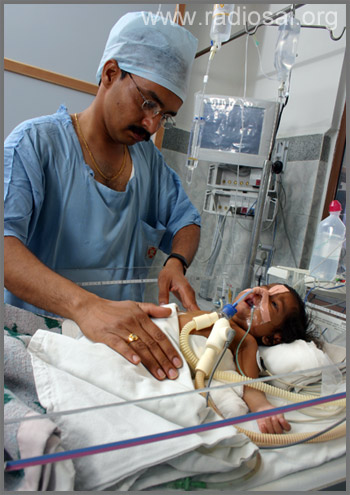 |
‘No, but something I should do for you’ he insisted.
I said, ‘Fine, when you reach home, everyday when you offer your Namaaz just include me in that prayer, that’s enough’.
These kind of experiences we do not get anywhere else. I am just giving you snippets but each such incident leaves some kind of a positive memory in your brain. And that is why I can say, over the years we have worked, we never bothered about arrival time in the Hospital or exit time from the Hospital.
And in fact in a lighter vein let me share this: When I joined here, I was the first senior resident in this department. And after half an hour of my taking charge and occupying my residential quarters, two people came and installed the intercom phone. My wife was thrilled, she said, ‘See, what a great thing it is; within half an hour of you joining, a phone has been installed’.
Fortunately she didn’t know that 24/7, 365 days I have to be on call; she didn’t realize that. At that time phone was a status symbol, so she was happy.
I said, ‘You will know why it has been kept in the next few days’.
So from then on umpteen number of calls in the nights started, it could be 11 p.m. or 12 in the midnight or 1 a.m. or 2 a.m.... there is an emergency call and you come to the Hospital and it may take two hours, or sometimes three hours or more. And then you go home, have a quick wash, and you are back again at work.
But never did you have the feeling, why I worked over time. Because that was the kind of the drive we have - this is Swami’s work and such a kind of work is not taking place anywhere else. There were no financial incentives or awards or gold medals or certificates, nothing of that sort. Maybe not even a personal interview from Swami but just that philosophy which only Bhagawan dare put it in action.
There are many people who give, who deliver lectures and talk. When Bhagawan spoke of this Hospital in 1990 I remember many people had made fun of this. They said, ‘Ok, let us see how it’s possible in one year’.
'Secondly, even if it is possible let us see how will it sustain,’ they remarked.
He has proved them wrong with two decades of its (the hospitals) existence. I think the Institute definitely has over grown its.. what you call paediatric pangs and slowly it's entering into its adolescence because He said - it's His own statement – this is going to exist for a thousand years, so actually even adolescence is not yet reached.
 |
 |
 |
 |
 |
 |
 |
 |
| Bhagawan at the SSSIHMS a short while before its inauguration, 22 Nov 1991 | |||||||
But these twenty years, overall if you see, I think one should not have any regrets. People who say 'Oh, more can be done' well, there is no ceiling on how much can be done but whatever has been done, you show me one other Institution in this country which has done to this magnitude and I’ll quit.
Healthcare was put as a welfare programme, but where is this kind of care provided to the poor people. That is why when you asked me, I said future direction is - and this is one dream, one promise - we should have a medical college anytime in the near future, if not immediate future.
If you ask if I have any personal concluding message, there is only one prayer: As long as we are here, Bhagawan should give us the strength, stability of mind and the one pointed dedication and devotion to carry on His mission. And as somebody said, days of the yore people used to go all the way to Varanasi for breathing their last, here I say if any one of us have a prayer, that is - while on our workfield we should depart, there cannot be anything greater than that. This is the only prayer. Jai Sai Ram!
RS: Thank you very much Sir. Sairam.
Thank you and loving Sai Ram,
Team Radio Sai






